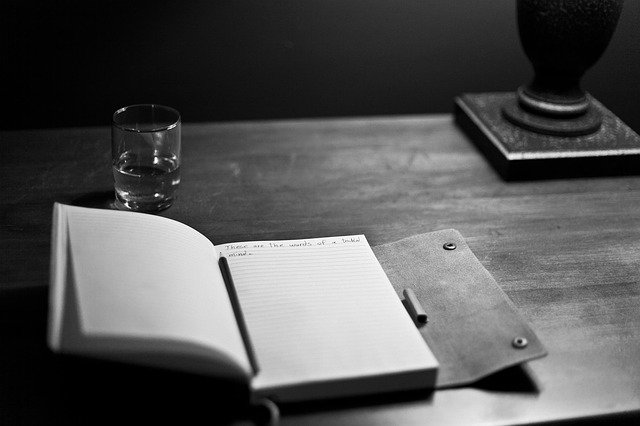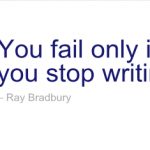How Writing Feeds Your Inspiration

Ahhhh, inspiration. That moment when the rest of the world falls away and all that’s left is you and the perfect sequence of words, like the unveiling of a mystery, the solving of a puzzle, everything all of the sudden just fits.
While these moments exist, and thank goodness that they do, most professional writers will confirm that inspiration isn’t enough to finish a project or to carry an idea to its fruition. You have to also sit down and slog through some pretty ugly stuff when everything you write looks awkward and stupid and you’re considering becoming a waitress or a used car salesman because this artist thing is just too hard.
But sitting down and slogging through the mud is actually what opens you up to moments of inspiration. It’s creating the space for it to happen and working through it when it isn’t present that allows for inspiration’s sudden arrival. Kind of like a lightning beacon – by showing up, sitting down, scribbling out some words that may look like total nonsense, you’re basically holding up a metal rod in the middle of the storm, saying “Okay, come and hit me.”
Many novice writers carry the erroneous notion that in order to write, they must first be inspired. Researcher David Boice found that writers who write on a daily basis have creative thoughts twice as often as those who only write when they feel like writing. William Faulkner said of inspiration: “I only write when I am inspired. Fortunately, I’m inspired at 9 o’clock every morning.”
It’s true. The writing process is the road to inspiration. Take this quote from Joyce Carol Oates: “The first sentence can’t be written until the last sentence is written.” It might sound like a Zen koan. But it basically means you start out not knowing where you’re going or even where you are. By the time you get to the end, you can finally see the beginning. But without going through the steps to get to the end, you’ll never even see the beginning and the rest of the story will never unfold.
Louis L’Amour advises us to “Start writing, no matter what. The water does not flow until the faucet is turned on.” Many writers describe the feeling they get when they’re writing as something transcendental. It has the ability to heal, to comfort, to transform and yes, to inspire. Catherine Drinker Bowen explains one of the great pleasures of writing, “For your born writer, nothing is so healing as the realization that he has come upon the right word”.
Neil Gaiman explains the feeling of fulfillment that writing can bring when he says, “Tomorrow may be hell, but today was a good writing day, and on the good writing days, nothing else matters.” Anne Frank said, “I can shake off everything as I write; my sorrows disappear, my courage is reborn.” Anais Nin defines the pleasure of writing: “We write to taste life twice, in the moment and in retrospect.” And Joss Whedon tells us that “I write to give myself strength. I write to be the characters that I am not. I write to explore all the things I’m afraid of.”
Joan Didion uses writing as an exploration of her own mind, “I write entirely to find out what I’m thinking, what I’m looking at, what I see and what it means. What I want and what I fear.” Toni Morrison advises us to use writing as creative fulfillment when she says, “If there is a book that you want to read, but it hasn’t been written yet, then you must write it.”
Some writers warn that writing comes with a huge price. Flannery O’Conner explains that, “Writing a novel is a terrible experience, during which the hair often falls out and the teeth decay. I’m always irritated by people who imply that writing fiction is an escape from reality. It is a plunge into reality and it’s very shocking to the system.” And George Orwell admits that, “Writing a book is a horrible, exhausting struggle, like a long bout of some painful illness. One would never undertake such a thing if one was not driven on by some demon whom one can neither resist nor understand.” (via WritersDigest)
The demon, the muse or whatever it is that drives writers to write is also what makes it so painful when they don’t. Though writing does have a price, what about the price of not writing? Paulo Coelho poetically explains that, “Tears are words that need to be written.” (via Goodreads) Mitch Albom says, “Nothing haunts us like the things we don’t say,” and Maya Angelou warns, “There is no greater agony than bearing an untold story inside you.” Writing not only inspires better writing, but having the courage to write inspires you to live more freely and courageously.
Kurt Vonnegut tells us, “We have to continually be jumping off cliffs and developing our wings on the way down.” (via BuzzFeed) And Ray Bradbury begs us, “Let the world burn through you. Throw the prism light, white hot, on paper” and “You must stay drunk on writing so reality cannot destroy you. (via WritersDigest)
And Franz Kafka instructs us, “Don’t bend; don’t water it down; don’t try to make it logical; don’t edit your own soul according to the fashion. Rather, follow your most intense obsessions mercilessly.” (via Goodreads) And Natalie Goldberg wants us to be brutally honest with ourselves in the writing process, “Write what disturbs you, what you fear, what you have not been willing to speak about. Be willing to be split open.” (via BuzzFeed)
The writing process takes you out of the mundane and throws you into the creative realm. It’s there that lightning most often strikes. So if you want to be inspired, don’t wait, write.





